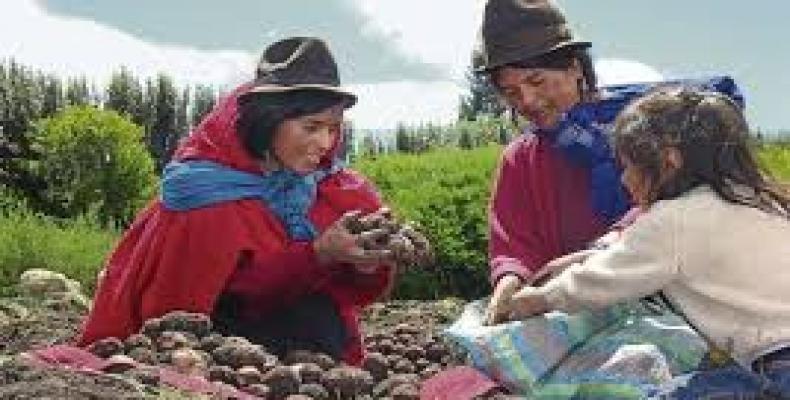Around the globe, the International Year of Family Farming, or the IYFF’s National Committees are continuing to work towards improving conditions for family and small-scale farmers.
National Committees around the world have organized and/or participated in numerous fairs, public forums and festivals. Cultural activities such as family farming themed exhibitions and competitions have been organised as well as marches and rallies. National Committees have collaborated with media and held press conferences in order to put the spotlight on family farming.
It is clear that family farming is being increasingly discovered and talked about and this is bringing about concrete change at local and national levels.
More than half way through The International Year of Family Farming, it is clear that the role of National Committees working in collaboration with governments, civil society organisations, NGOs, farmers' organisations, international institutions and research centres is bringing about positive change.
There are 16 National Committees for family farming in Africa, 16 in the Americas, 8 in Europe, 4 in Asia and one in Oceania. In the first 6 months of 2014, these committees have organised more than 300 activities to raise awareness about family farming.
In the case of Latin America, the definition of family farming is far from homogeneous. Nevertheless, there are common elements that distinguish it from other farming. It is the combination of the small size of its land, the use of family labor, where they live and what happens to their products
In South America, the 15 national committees and 12 other organisations belonging to the Confederation of Family Farmers of MERCOUR have issued the Regional Montevideo Declaration comprising some twenty concrete demands relating to family farming.
Declarations and roadmaps restating proposals to improve national public policies have been drawn up and presented to the competent authorities by the National Committees of Mexico, Paraguay and Costa Rica, among others.
A number of governments have also issued official declarations in favour of family farming including the Andean Parliamentary Declaration.
New and specific draft laws are continuing to emerge within the framework of the 2014 International year of the family farm. This is the case in Paraguay with its Decree on public pro curement of food products from family farmers.
Similarly in Colombia, a Ministerial Resolution provides for the launching of a Family Farming Programme, has officially established the family farming concept along with a technical committee for the sector.
In Argentina, the government has issued a Decree providing for the establishment of a State Secretariat for Family Farming.
Family farming policy in Cuba similarly focuses on this small scale endeavour, favoring this variant of agricultural production with the participation of members of the family in activities on the holding.
Given its seasonality, this way of producing suffers common environmental risks, including those linked to the effects of increasing climate variability and outright climate change. Subsistence family farming is particularly vulnerable.
The literature about agriculture in Cuba, where a high percentage of food for non-farmers has still to be imported, indicates successes with urban agriculture and agro-ecologically sound agriculture in family farming
For the defenders of family farming in Cuba the land has become a bond in family ties. Children often come from afar to share agricultural work, perpetuating in this way both knowledge and practice. The concept of family farming is linked to local traditional agriculture.
Valuable indigenous rural knowledge is seen to have its place in Cuban family farming. Farm families not only are first hand observers of local characteristics, they also treasure the knowledge acquired through experiential learning. An example is the selection of seeds that do well under limiting climatological growth conditions such as drought and cyclones. This deserves particular attention in confronting the consequences of climate change.
in Cuba, farmers indicated that the daily use of weather forecasts, which include variables like cloud cover, wind and expected rains, can yield appropriate times for sowing, crop protection and harvesting
The inclusion of members of family farming systems into networks of climate services for agriculture has become a basic tool for reducing vulnerabilities.
In Cuba these Agro-meteorological Services have been developed with two basic purposes:
-
to reach small producers and their families with timely client friendly agro-meteorological or agro-climate services,
-
and ii) to collect and this way rescue traditional and other agro-meteo rological knowledge from the traditional farm worker.
And there we have it! The traditional past working with the scientific present for the betterment of Cuban society as a whole.


